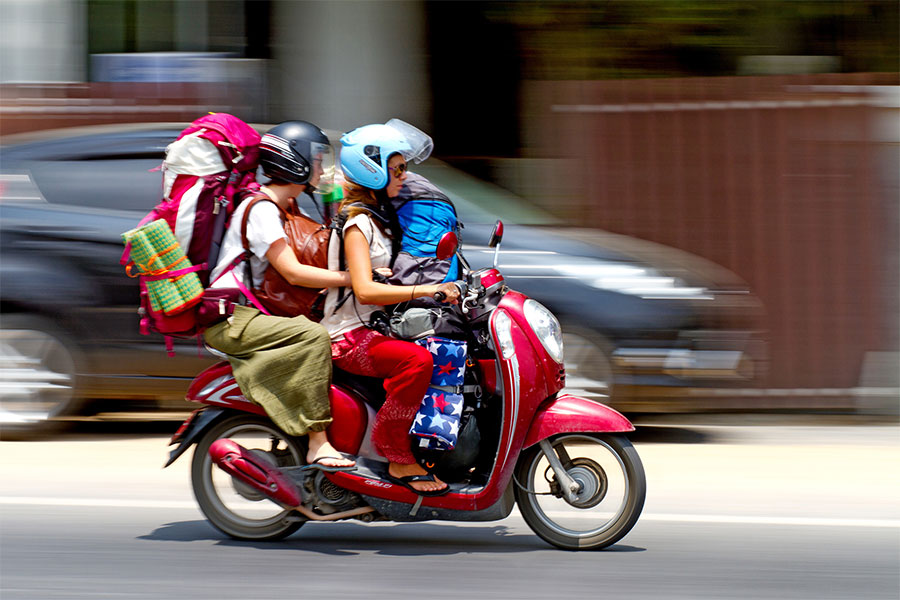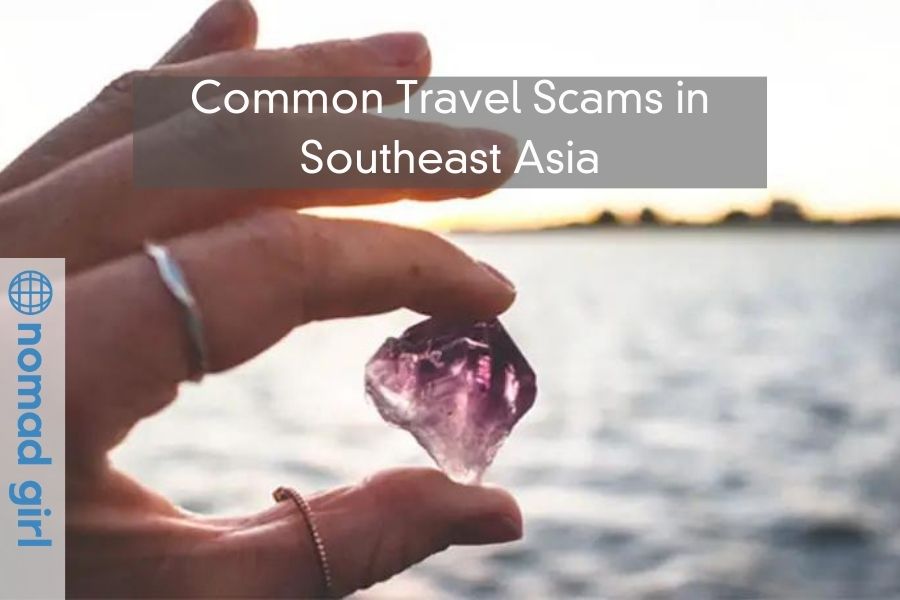Travel scams in Southeast Asia are a common problem for many unsuspecting tourists. I am going to list a few so you can be prepared. If you do fall victim to a travel scam, report it to the authorities immediately. Remember, being informed and taking necessary precautions can help protect you from falling victim to travel scams.
Cheap overnight buses
It’s important to be cautious when searching for cheap overnight bus tickets in South East Asia. While some discounted tickets may seem like a great deal, there have been reports of scams where passengers’ bags are searched and valuable items are taken from the luggage compartment while they are on board, thinking their belongings are safely stored away. It’s important to research the reputation of the bus company and take necessary precautions to protect your belongings while travelling.
A common scam in South-East Asia involves stealing luggage from overnight buses. To prevent falling victim to this, it’s recommended to either take government buses, which may not be as comfortable but are generally safer or to keep your valuables in a day pack that is with you at all times and locked while you sleep. Additionally, it’s best to lock the day pack to your seat for added security.
Incorrect Change in Foreign Currency
In popular tourist destinations, tourists often fall victim to receiving incorrect change when purchasing goods from small shops, markets, or street vendors. This is a long-standing issue that has been prevalent for quite some time. The foreign currency exchange can make it difficult for tourists to notice discrepancies in their change.
In a crowded marketplace, it can be difficult to determine whether the notes received as change from vendors are genuine or counterfeit. This puts customers at risk of unknowingly accepting fake currency, which can result in financial loss. It’s important to be vigilant and take time to thoroughly check the notes received before putting them away.
Taxi passengers may fall victim to incorrect change given by drivers who may drive away before the passengers have had a chance to count their change. To avoid being scammed, it is advisable to carry small changes instead of large notes and to pay for goods and services with the exact amount of money.
Gemstone Scams

It is a common occurrence, particularly in South East Asia, for tourists to be pressured into visiting specific shops such as tailor shops, travel agents, and gems and jewellery stores. Unfortunately, some of these stores may engage in scams, particularly when it comes to gems. Travellers may be convinced to purchase gems by being told that there are exclusive tax-free arrangements for foreigners or that the store is having a significant sale. It is important for tourists to be aware of these tactics and to approach such offers with caution.
Travellers should be cautious when purchasing gems from store owners who make extravagant claims about the potential for profit by reselling them in their home countries. These claims often turn out to be part of a scam, as the gems or diamonds sold by these individuals are typically of very poor quality and overpriced. It’s important to do your research and only buy from trusted sources to avoid being taken advantage of.
Friendly kids in large groups
It’s important for travellers to be aware of a common scam in many countries where large groups of children approach them with distracting questions or products. While the traveller is occupied, other children will steal their valuables without being noticed. To avoid this, it’s best to steer clear of large groups of children and keep all valuables in a locked day pack with zip compartments. Additionally, it’s recommended to pack away expensive accessories and sunglasses when not in use to further prevent theft.
Motorbike Rentals
Travellers frequently encounter issues with motorbike rentals, as they are often targeted by scams. Upon returning a rented motorbike at the end of the day, store owners may falsely claim that the motorbike has been damaged in some way, blaming the traveller for issues such as paint scratches, small dents or mistreated parts. Travellers often fail to thoroughly inspect the motorbike before renting it, and may hastily sign the paperwork without fully reviewing it before departing. It is important for travellers to be aware of these common scams and take precautionary measures to avoid them.

It is common for bike rental store owners to insist on customers paying for damages that cannot be proven to have existed prior to renting the bike. These charges are often outlined in the rental agreement that customers may not have read thoroughly. To prevent this situation, it is advisable to inspect the bike for any scratches or dents before leaving the store, and take photos of the bike and any damages with a camera if possible. This will serve as evidence in case of any disputes regarding damages and rental charges.
Renting motorbikes can come with a risk of theft, particularly in South East Asia where a common scam involves employees of the rental store stealing the rented bike. This scam typically occurs when a traveller parks the bike and goes to explore an attraction, leaving the bike unattended and out of sight. The employee then takes advantage of the opportunity and steals the bike using a spare key. It’s important to be aware of this issue and take necessary precautions to avoid becoming a victim of this scam.
2022 update – have an Airtag or something equivalent hidden on the motorbike, quite a few scammers have been found out and jailed this way.
In the event that your rented motorbike is stolen, it is necessary to go back to the rental store and inform them of the situation. As per the rental agreement that you agreed to before renting the bike, there may be a requirement to compensate for the loss by purchasing a new bike. It is crucial to thoroughly read and comprehend all rental agreements before signing them to prevent unforeseen costs.
When visiting tourist attractions and enjoying your day, it can be easy to overlook the security of your motorbike. However, theft is a common occurrence and it’s important to take preventative measures. One effective way to deter thieves is by using a small lock on the motorbike chain and even a bike lock to secure the bike to a pole. This simple step can greatly reduce the risk of theft.
Exchange Rate Scams
Foreign currency exchange services are commonly offered near border crossings, on trains, and at designated shops along bus routes. Additionally, individuals may approach pedestrians at border crossings to offer currency exchange services.
It’s common for unofficial money exchangers to offer incorrect exchange rates, resulting in a poor deal for customers. They do this to make a profit. To avoid being scammed, it’s best to exchange currencies only at official cash exchange booths or banks. Make sure to check the official exchange rate beforehand and double-check the exchanged amount to ensure accuracy.
To get the latest exchange rates and easily convert currencies, visit the website www.xe.com or download the XE Currency app on your mobile device.
Taxi and Tuk tuk drivers and hotel commissions
It’s not uncommon for taxi or tuk-tuk drivers to receive commissions for bringing travellers to certain hotels. However, some drivers may try to persuade you to stay at a different hotel by claiming that the one you booked has closed down or suffered damage. It’s important to stick to your original plan and insist on going to the hotel you booked.
I had a taxi driver in Hanoi trying to scam me in a very nifty way. From the airport, I took a taxi to a hotel in the historic quarter. The taxi driver was making some calls and eventually, I ended up at the hotel with the same name as the one I wanted to go to but not in the historic quarter. I got suspicious as soon as I opened the taxi a person come up to me saying he was the hotel manager and gave me his business card. Who does this? Then looking around it did not feel historic to me. I told the driver I was going to call the hotel and then he admitted to the scam. Yes in Vietnam scam hotels have different signs to quickly change names and they all have business cards to match these names.
For budget travellers, Southeast Asia has a range of affordable accommodations such as hostels and hotels in countries like Vietnam and India. When requesting a drop off, it’s important to double check with the driver that you’ve arrived at the correct location. Rest assured that these options can be as cost-effective as the original accommodations you had in mind.
The coin collection scam
This scam in Vietnam is actually quite cute as it involves young children and as tourists, we all have a soft spot for them. A child will ask you where you are from, and when you say Europe he or she will show his coin collection of all his coins but is missing the one and two euro coins. You feel compelled to give them these coins. A few days later you are somewhere else and a child or adult will come to you and ask where you are from. They will then show you Euro coins and ask if you can exchange them for Vietnamese money. This scam is nifty because you do not notice the link, it is also not that costly.
There are many more scams out there in action in many different countries and tend to be quite common in the most popular destinations for tourists. I would love to hear about your experiences with scams, what country you were in and how you dealt with the situation.


















